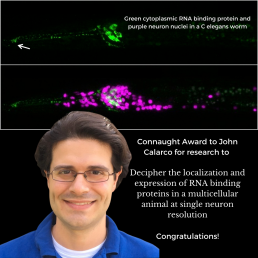Professor John Calarco has been granted a Connaught New Researcher Award to publish a detailed atlas of RNA binding proteins (RBPs), key regulators of gene expression, in the nervous system of the roundworm C. elegans. Mutations in RBP genes are thought to be associated with diseases including cancer and neurological disorders, so this atlas will provide insights into how those conditions can develop.
As a gene is read from the DNA blueprint of the cell, it produces a long primary RNA transcript that must be processed to a shorter mRNA. RBPs work together to guide RNA processing to produce mRNA, and ultimately translated protein, in the amounts that the cell needs. Calarco has identified over one hundred RBPs expressed in the nervous system of C. elegans. Undeterred by this large number, he will combine available resources and CRISPR technology to label specific RBPs with fluorescent protein tags.
A further challenge in studying the function of these proteins is that they have variable abundance in different cells and only bind to specific RNAs. Many RNA transcripts are also recognized by different cocktails of RBPs through defined sequences, so they can only be processed correctly by one or multiple combinations of specific RBPs.
Finally, it is important to understand the subcellular locations of RBPs, because they are active in RNA processing and metabolism both in the nucleus and cytoplasm. This finely tuned regulation of RNA processing by RBPs is key to how the diverse cell types in the nervous system work together to respond to external stimuli and drive behavioral responses.
Calarco’s lab in the Department of Cell & Systems Biology will use advanced microscopy techniques to create an atlas with the precise location of specific labelled RBPs within each cell of the C. elegans nervous system. By combining information on RBP location with expression of genes containing RBP-binding sequences, a deeper understanding into the evolution of neuronal diversity and a more accurate representation of gene expression in the nervous system can be developed.
The Connaught New Researcher Award serves to foster excellence in research and innovation by providing support for new University of Toronto faculty members who are launching their academic careers. These awards are intended to establish a strong research program, thereby increasing the faculty member’s competitiveness for external funding.
“Receiving the Connaught Award has provided a much-appreciated source of seed funding to advance the goals of this ambitious project.” says Calarco, “Particularly, it has enabled me to recruit new trainees to work alongside my postdoctoral fellow Dr John Laver, who has been a major driving force in advancing this study. With this support from the University of Toronto, we are now certain to bring the first phase of our project to its completion, which is very exciting for us!”
Congratulations, Professor Calarco!

